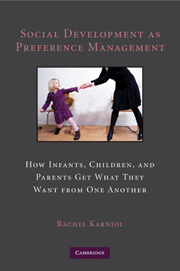 Social Development as Preference Management
Social Development as Preference Management Book contents
- Frontmatter
- Contents
- Acknowledgments
- Introduction
- 1 The Baby “Preference Game”
- 2 Children's Expression of Preferences
- 3 Emerging Meta-Preferences
- 4 Other People's Preferences
- 5 Parenting and Preference Management
- 6 Channeling Children's Preferences
- 7 Temporizing Preferences
- 8 Restricting Children's Preferences
- 9 Disciplining Noncompliance
- 10 Planes of Transformational Thought: Temporal, Imaginal, and Mental
- 11 Manipulating Others
- 12 Coping and Self-Regulating
- 13 Mind Play: Applying Transformational Thought
- 14 Minding One's Own Versus Others' Preferences: Altruism, Aggression, and Morality
- 15 Tying Up
- References
- Subject Index
- Name Index
1 - The Baby “Preference Game”
Published online by Cambridge University Press: 05 June 2012
- Frontmatter
- Contents
- Acknowledgments
- Introduction
- 1 The Baby “Preference Game”
- 2 Children's Expression of Preferences
- 3 Emerging Meta-Preferences
- 4 Other People's Preferences
- 5 Parenting and Preference Management
- 6 Channeling Children's Preferences
- 7 Temporizing Preferences
- 8 Restricting Children's Preferences
- 9 Disciplining Noncompliance
- 10 Planes of Transformational Thought: Temporal, Imaginal, and Mental
- 11 Manipulating Others
- 12 Coping and Self-Regulating
- 13 Mind Play: Applying Transformational Thought
- 14 Minding One's Own Versus Others' Preferences: Altruism, Aggression, and Morality
- 15 Tying Up
- References
- Subject Index
- Name Index
Summary
A toddler crawls into her mother's lap while the mother is drinking coffee. The mother asks, ‘And what do you want, hmm? You're not having my coffee. No.’ When the child looks at the observer's coffee, she says, ‘You're not having her coffee either.’
(Snow, 1984, p. 81)In this chapter, I trace the emergent way caretakers, who for the sake of convenience will be called “mothers,” and infants (who for convenience will be referred to as males) communicate with each other in the context of the Baby “Preference Game,” a game that can be described as “you tell me your preferences, I'll tell you my preferences, and then.…” First, I focus on what mothers do to infer their infants' preferences, and then I elaborate what infants do to convey their preferences to their mothers.
WHY DO I CALL THIS A GAME?
As I will try to show in this chapter, the interactive episodes that emerge between mothers and their infants are a game for all intents and purposes because both parties try to decipher the rules governing their interaction in the attempt to achieve their goals – getting more of their preferences satisfied and doing so as quickly as possible. But infant–mother interactions have many parallels with the game of charades, because one side can only use physical actions to convey meaning, and the other side needs to infer what these physical actions are supposed to imply. However, in the game of charades, players capitalize on conventionalized symbols whose meanings are socially shared, but the infant players in the Baby “Preference Game” do not know how to use conventionalized symbols.
- Type
- Chapter
- Information
- Social Development as Preference ManagementHow Infants, Children, and Parents Get What They Want from One Another, pp. 10 - 25Publisher: Cambridge University PressPrint publication year: 2010
